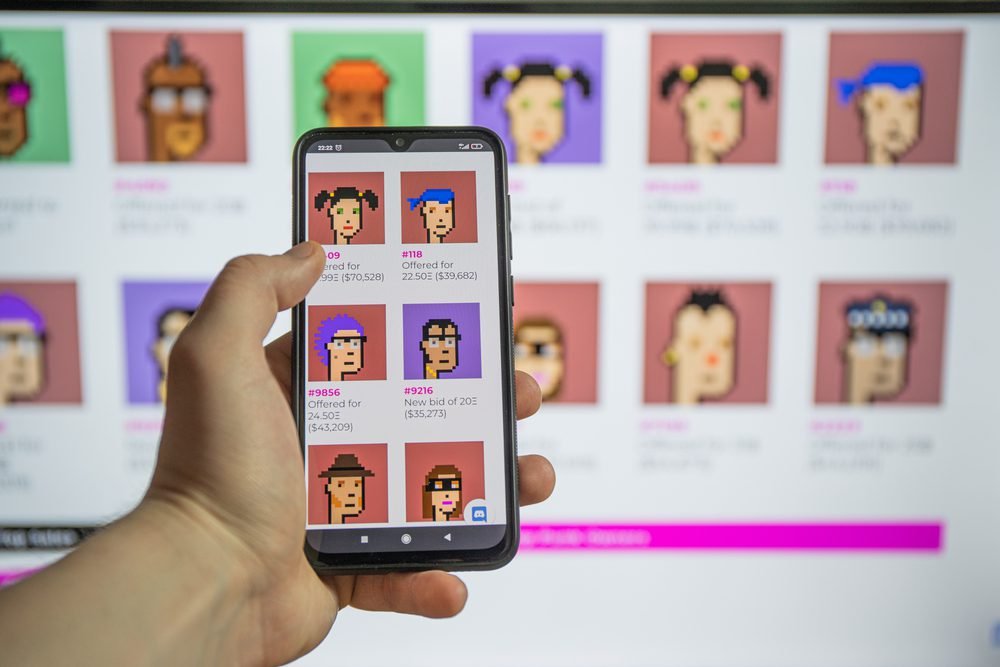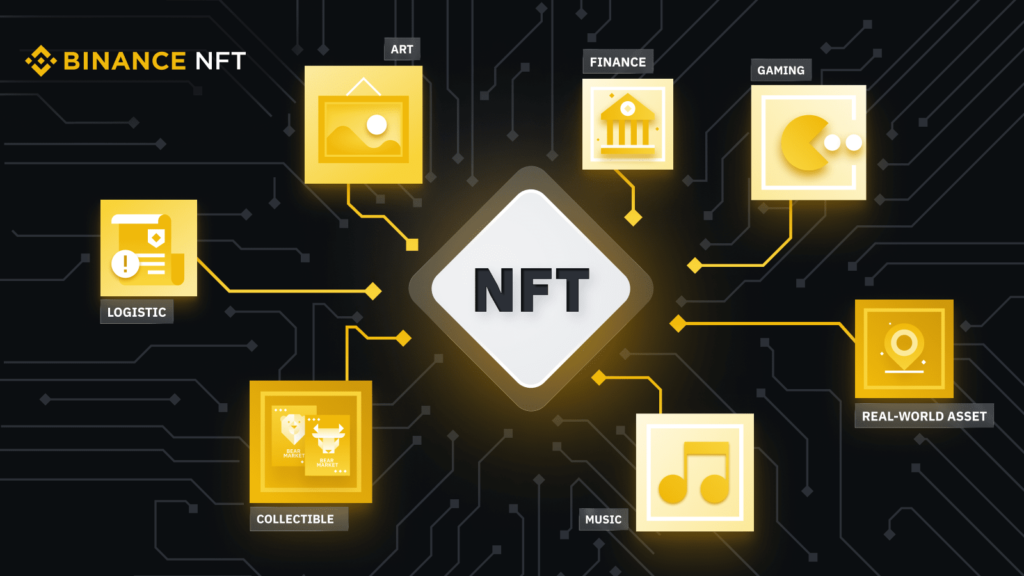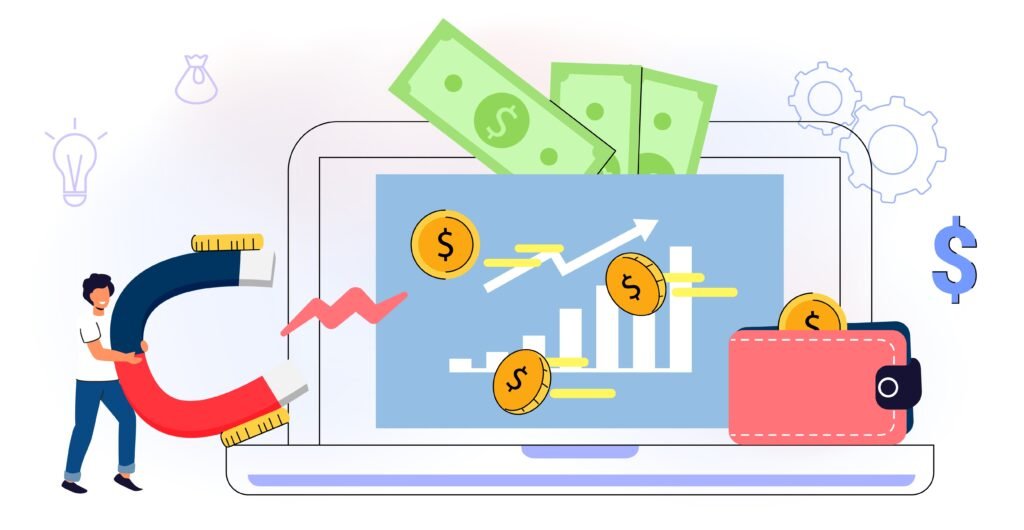1. **NFTs and Digital Collectibles**: Creating and selling unique digital assets, such as art, music, or virtual real estate, through NFT (Non-Fungible Token) marketplaces.
2. **Web3 and Metaverse Investments**: Investing in virtual real estate, cryptocurrencies, and blockchain projects within the emerging Web3 space and Metaverse platforms.
3. **Content Monetization**: Generating income through various content creation avenues like YouTube, podcasts, blogs, and social media, leveraging ad revenue, sponsorships, and affiliate marketing.
4. **Online Courses and Digital Products**: Developing and selling online courses, e-books, software, or digital tools to share knowledge and expertise with a global audience.
5. **Remote Services and Freelancing**: Offering specialized services remotely through platforms like Upwork, Fiverr, or freelancing websites in areas such as graphic design, copywriting, programming, or virtual assistance.

1. **NFTs and Digital Collectibles**:
– NFTs provide a way to tokenize unique digital assets, enabling artists, musicians, and creators to sell their work as one-of-a-kind tokens on blockchain platforms.
– By creating and selling NFTs, individuals can tap into a growing market interested in owning digital collectibles, art pieces, music albums, and even virtual real estate.
– Platforms like OpenSea, Rarible, and Foundation allow creators to mint and sell their NFTs, potentially earning substantial profits from the sale of these digital assets.
**NFTs and Digital Collectibles** have revolutionized the art and collectibles market by leveraging blockchain technology to authenticate and tokenize digital assets. Here is a deeper dive into this innovative way to make money online:
1. **Tokenization of Digital Assets**: NFTs represent ownership of unique digital items, certifying their scarcity and authenticity on the blockchain. Creators can tokenize various digital content, including artwork, music, videos, virtual real estate, and even tweets.
2. **Marketplaces and Platforms**: Several online platforms like OpenSea, Rarible, Foundation, and Nifty Gateway facilitate the creation, minting, buying, and selling of NFTs. These platforms provide a marketplace for artists, collectors, and enthusiasts to transact with digital assets securely.
3. **Monetization Opportunities**: Creators can generate income through primary sales of their NFTs or earn royalties on secondary sales. This allows artists to benefit from the appreciation of their work in the resale market, potentially creating a recurring revenue stream.
4. **Community Engagement**: NFTs enable direct interaction between creators and their audience, fostering a sense of community and ownership among supporters. By engaging with fans through social media, Discord channels, and virtual events, creators can build a loyal following that supports their NFT releases.

5. **Crossover with Traditional Industries**: NFTs have bridged the gap between digital and physical worlds, leading to collaborations across various industries. Artists, musicians, athletes, and brands are exploring NFTs as a new avenue for creative expression, fan engagement, and revenue generation.
6. **Legal and Copyright Considerations**: As NFTs involve the creation and sale of digital assets, creators must address copyright, licensing, and intellectual property rights to protect their work. Understanding the legal implications of minting and selling NFTs is crucial to avoid disputes and ensure compliance with regulations.
7. **Educational Resources and Communities**: To succeed in the NFT space, creators can leverage educational resources, online communities, and guides to learn about NFT trends, best practices, and strategies for minting and marketing digital collectibles effectively. By tapping into the growing popularity of NFTs and digital collectibles, individuals can explore a unique opportunity to monetize their creativity, connect with a global audience, and participate in an innovative ecosystem that continues to evolve and expand.
2. **Web3 and Metaverse Investments**:

– Web3 refers to the next generation of the internet, emphasizing decentralization, blockchain technology, and user ownership of data and assets.
– Investing in Web3 projects, cryptocurrencies, and Metaverse platforms can offer lucrative returns as these technologies gain traction and reshape how people interact online.
– Metaverse investments involve acquiring virtual real estate, digital assets, and tokens within immersive online environments, anticipating their increased value as the Metaverse evolves.
**Web3 and Metaverse Investments** represent a paradigm shift in how individuals interact with the internet and virtual environments. Here is an in-depth exploration of this innovative way to make money online:
1. **Decentralized Ecosystems**: Web3 focuses on decentralization, data ownership, and blockchain technology to create a more transparent and user-centric internet. By investing in Web3 projects, individuals can support decentralized applications (dApps), blockchain platforms, and cryptocurrencies that aim to disrupt traditional industries.
2. **Metaverse Development**: The Metaverse refers to a collective virtual space where users can interact with each other, digital assets, and environments in real-time. Investing in Metaverse platforms like Decentraland, Sandbox, and Roblox enables individuals to acquire virtual land, assets, and tokens that hold value within these immersive worlds.
3. **Tokenomics and Cryptocurrency**: Understanding tokenomics, the economics of tokens, and cryptocurrency markets is essential for successful Web3 and Metaverse investments. By researching projects, analyzing whitepapers, and staying informed about market trends, investors can make informed decisions about allocating capital in this space.

4. **Virtual Real Estate**: Investing in virtual real estate within the Metaverse has gained popularity as users seek to own digital land, buildings, and assets that can appreciate in value over time. Virtual real estate can be developed, rented, and monetized, offering diverse investment opportunities in the digital realm.
5. **Gaming and NFT Integration**: Many Metaverse platforms incorporate gaming elements, NFTs, and digital collectibles to enhance user engagement and monetization. By investing in gaming-related projects, NFT marketplaces, and virtual assets, individuals can participate in the growing convergence of gaming and blockchain technology.
6. **Community Building and Networking**: Engaging with communities, attending virtual events, and networking with industry experts can provide insights into emerging trends, investment opportunities, and potential collaborations within the Web3 and Metaverse space. Building relationships with like-minded individuals and staying connected to the ecosystem can open doors to new investment prospects.
7. **Risk Management and Due Diligence**: As with any investment, individuals should practice risk management, conduct due diligence on projects, and diversify their investment portfolio to mitigate potential losses. Understanding the volatility of cryptocurrency markets and the nascent nature of Web3 technologies is crucial for making informed investment decisions. By exploring opportunities in Web3 and the Metaverse, individuals can participate in a transformative digital landscape that offers new avenues for investment, innovation, and financial growth in the evolving online economy.
3. **Content Monetization**:

– Content creators can monetize their work through various channels like YouTube ad revenue, sponsorships, affiliate marketing, and merchandise sales.
– Building a loyal audience through engaging content and leveraging platforms like Patreon, Substack, and Twitch can provide a consistent income stream.
– Diversifying revenue streams by offering exclusive content, hosting webinars, or creating online communities can enhance earnings potential in the long run.
**Content Monetization** offers a diverse range of opportunities for individuals to generate income through creating and sharing valuable content online. Here is a detailed exploration of this innovative way to make money:
1. **Multiple Revenue Streams**: Content creators can monetize their work through various channels, including:
– **Ad Revenue**: By partnering with ad networks like Google AdSense or YouTube Partner Program, creators can earn money based on ad impressions and clicks on their content.
– **Sponsorships**: Collaborating with brands and companies for sponsored content, product placements, or endorsements can provide creators with additional revenue streams.
– **Affiliate Marketing**: Promoting products or services through affiliate links and earning a commission for every sale or lead generated through their referral.
– **Merchandise Sales**: Selling branded merchandise, such as clothing, accessories, or digital products, can be a lucrative way to monetize a loyal fan base.
2. **Platform Diversity**: Content creators can leverage a variety of platforms to reach and engage with their audience:
– **YouTube**: Monetizing videos through ads, memberships, Super Chats, and YouTube Premium subscriptions.
– **Podcasts**: Generating income through sponsorships, listener donations, premium content subscriptions, and merchandise sales.
– **Blogs**: Monetizing blogs through display ads, sponsored content, affiliate marketing, and selling digital products or courses.
– **Social Media**: Leveraging platforms like Instagram, TikTok, Twitter, and Facebook for brand partnerships, sponsored posts, and affiliate marketing.
3. **Audience Engagement**: Building a strong relationship with their audience is crucial for content creators to drive engagement and monetization opportunities:
– **Community Building**: Creating a sense of community through social media, newsletters, live streams, and exclusive content can foster a loyal fan base.
– **Engagement Strategies**: Encouraging audience interaction, responding to comments, hosting Q&A sessions, and soliciting feedback can enhance engagement and loyalty.

4. **Content Strategy**: Developing a content strategy that aligns with audience interests, trends, and search engine optimization (SEO) can help creators attract and retain viewers:
– **Consistent Posting**: Regularly creating and publishing high-quality content can improve visibility, engagement, and audience growth.
– **Diversified Content Formats**: Experimenting with different content formats, such as videos, podcasts, blogs, infographics, and livestreams, can appeal to a broader audience and cater to diverse preferences.
5. **Analytics and Optimization**: Monitoring performance metrics, analyzing audience demographics, and optimizing content based on data insights can help creators refine their strategies and maximize monetization potential:
– **Data-driven Decisions**: Using analytics tools to track key performance indicators (KPIs) like views, watch time, click-through rates, and conversion rates to inform content decisions.
– **A/B Testing**: Experimenting with different content types, titles, thumbnails, and posting schedules to identify what resonates best with the audience and drives monetization.
By leveraging the power of content monetization strategies, creators can turn their passion into a sustainable income source, engage with a global audience, and build a thriving online presence that resonates with viewers and drives financial success.
4. **Online Courses and Digital Products**:

– Developing and selling online courses on platforms like Udemy, Teachable, or Coursera allows individuals to share their expertise and knowledge with a global audience.
– Creating e-books, software tools, or digital products can provide passive income opportunities as these products can be sold repeatedly without additional effort.
– Marketing strategies such as email campaigns, social media promotion, and SEO optimization can help attract customers to these digital products and courses.
**Online Courses and Digital Products** present lucrative opportunities for individuals to share their expertise, knowledge, and creativity with a global audience. Here is a comprehensive exploration of this innovative way to make money online:
1. **Online Course Creation**:
– **Subject Expertise**: Leveraging one’s expertise in a particular field to create online courses on platforms like Udemy, Coursera, Teachable, or Skillshare.
– **Curriculum Design**: Structuring course content in a logical and engaging manner to cater to the learning needs of students, incorporating multimedia elements, quizzes, and assignments.
– **Video Production**: Recording high-quality video lectures, tutorials, and demonstrations to deliver engaging and informative course material to learners.
– **Interactive Elements**: Incorporating interactive elements like discussion forums, live Q&A sessions, and virtual classrooms to enhance student engagement and learning outcomes.
2. **E-book and Digital Product Development**:

– **Writing and Publishing**: Creating e-books, guides, manuals, or workbooks on topics of interest or expertise to sell on platforms like Amazon Kindle Direct Publishing or Gumroad.
– **Design and Formatting**: Ensuring professional design, layout, and formatting of digital products to enhance their appeal and readability for customers.
– **Content Updates**: Regularly updating and refreshing digital products to provide value to customers and encourage repeat purchases.
– **Cross-Promotion**: Promoting digital products through email marketing, social media campaigns, partnerships, and collaborations to reach a wider audience and drive sales.
3. **Marketing and Sales Strategies**:

– **Targeted Marketing**: Identifying a niche audience and tailoring marketing strategies to reach and engage with potential customers interested in the subject matter of online courses or digital products.
– **SEO Optimization**: Optimizing course descriptions, titles, and keywords for search engines to improve visibility and attract organic traffic to course listings or product pages.
– **Email Campaigns**: Building an email list of subscribers and leveraging email marketing campaigns to promote new course launches, product releases, discounts, and special offers.
– **Sales Funnels**: Creating sales funnels that guide potential customers through the purchasing process, from awareness and interest to decision-making and conversion.
4. **Customer Support and Feedback**:

– **Responsive Communication**: Providing timely and helpful responses to customer inquiries, feedback, and support requests to ensure a positive customer experience.
– **Feedback Collection**: Gathering feedback from students or customers through surveys, reviews, and testimonials to improve course content, product features, and overall customer satisfaction.
– **Community Building**: Establishing a community of learners or customers through forums, groups, or social media platforms to foster engagement, collaboration, and ongoing support.
5. **Monetization Strategies**:

– **Pricing Models**: Determining appropriate pricing strategies for online courses and digital products based on market demand, competition, perceived value, and target audience affordability.
– **Bundle Offers**: Creating bundled packages, course subscriptions, or product bundles to incentivize customers to purchase multiple items at a discounted rate.
– **Upselling and Cross-Selling**: Offering complementary products, advanced courses, or additional resources to existing customers to increase sales and customer lifetime value.
– **Affiliate Programs**: Establishing affiliate programs to incentivize partners, influencers, or affiliates to promote and sell courses or products in exchange for a commission on sales.
By leveraging online courses and digital products, individuals can monetize their expertise, creativity, and skills, reach a global audience, and create scalable income streams that offer long-term financial growth and opportunities for personal and professional development.
5. **Remote Services and Freelancing**:

– Offering remote services and freelancing in areas like graphic design, copywriting, programming, or virtual assistance allows individuals to work from anywhere and connect with clients worldwide.
– Platforms like Upwork, Fiverr, and Freelancer provide a marketplace for freelancers to showcase their skills, secure projects, and build a client base.
– Building a strong portfolio, delivering high-quality work, and networking with potential clients can lead to a steady flow of projects and income in the freelancing industry.
**Remote Services and Freelancing** offer individuals the flexibility to work from anywhere and provide specialized services to clients worldwide. Here is a detailed exploration of this innovative way to make money online:
1. **Service Offerings**:
– **Specialized Skills**: Offering services in areas such as graphic design, copywriting, programming, digital marketing, virtual assistance, video editing, and more based on individual expertise and experience.
– **Consulting**: Providing consulting services in niche industries, offering strategic advice, market research, business development, and project management expertise to clients seeking professional guidance.
– **Creative Services**: Delivering creative services like illustration, photography, content writing, branding, and social media management to help businesses enhance their online presence and marketing efforts.
2. **Freelancing Platforms**:
– **Upwork**: Utilizing platforms like Upwork to create a profile, showcase skills and expertise, bid on projects, and connect with clients seeking freelance services in various industries and domains.
– **Fiverr**: Offering services on Fiverr’s marketplace, creating gigs, setting prices, and providing high-quality deliverables to attract clients and build a reputation as a reliable freelancer.
– **Freelancer**: Registering on Freelancer to browse job listings, submit proposals, and collaborate with clients on projects ranging from short-term gigs to long-term contracts in a global freelance marketplace.
3. **Client Acquisition**:
– **Portfolio Development**: Building a strong portfolio showcasing past work, projects, client testimonials, case studies, and achievements to demonstrate expertise and attract potential clients.
– **Networking**: Engaging in networking events, online communities, social media platforms, and industry forums to connect with potential clients, collaborators, and industry professionals.
– **Referrals**: Encouraging satisfied clients to provide referrals, testimonials, and recommendations to expand the client base and establish credibility as a trusted freelancer in the market.
4. **Project Management**:
– **Communication**: Maintaining clear and effective communication with clients through email, chat platforms, video calls, and project management tools to ensure project requirements, timelines, and deliverables are understood and met.
– **Time Management**: Efficiently managing time, setting priorities, establishing deadlines, and delivering high-quality work within agreed-upon timelines to build trust and reputation as a reliable freelancer.
– **Feedback and Revisions**: Soliciting feedback, addressing client concerns, and incorporating revisions or edits based on client input to deliver satisfactory outcomes and maintain positive client relationships.
5. **Professional Development**:
– **Skill Enhancement**: Continuously learning and upgrading skills through online courses, workshops, certifications, and industry resources to stay relevant, competitive, and capable of meeting evolving client demands.
– **Market Research**: Keeping abreast of industry trends, client needs, market demands, and competitive landscape to identify opportunities for service expansion, specialization, and differentiation in the freelance marketplace.
– **Client Relationship Management**: Cultivating long-term relationships with clients, providing exceptional service, offering value-added solutions, and seeking opportunities for repeat business, referrals, and extended collaborations to foster client loyalty and retention.
By offering remote services and freelancing, individuals can leverage their expertise, creativity, and skills to build a successful freelance career, connect with clients globally, and create a flexible and fulfilling work lifestyle that aligns with their professional goals and aspirations.

In conclusion,
In conclusion, the digital landscape offers a multitude of innovative ways to make money online, from NFTs and digital collectibles to Web3 investments, content monetization, online courses, and freelancing. Each avenue presents unique opportunities for individuals to leverage their creativity, expertise, and skills to generate income, reach a global audience, and build sustainable revenue streams.
By embracing these digital trends and exploring diverse monetization strategies, individuals can unlock new possibilities for financial growth, personal development, and professional success in the ever-evolving online economy. Whether creating NFTs, sharing knowledge through online courses, or offering remote services as a freelancer, the key lies in adapting to emerging technologies, engaging with audiences, and seizing opportunities to innovate and thrive in the dynamic digital landscape.
As the digital world continues to evolve, individuals who harness the power of online platforms, connect with communities, and deliver valuable content and services stand poised to shape their own success stories, establish thriving online businesses, and make a meaningful impact in the digital realm. Embracing creativity, resilience, and a spirit of entrepreneurship can pave the way for a rewarding journey towards financial independence and fulfillment in the digital age.





Thanks for sharing. I read many of your blog posts, cool, your blog is very good.